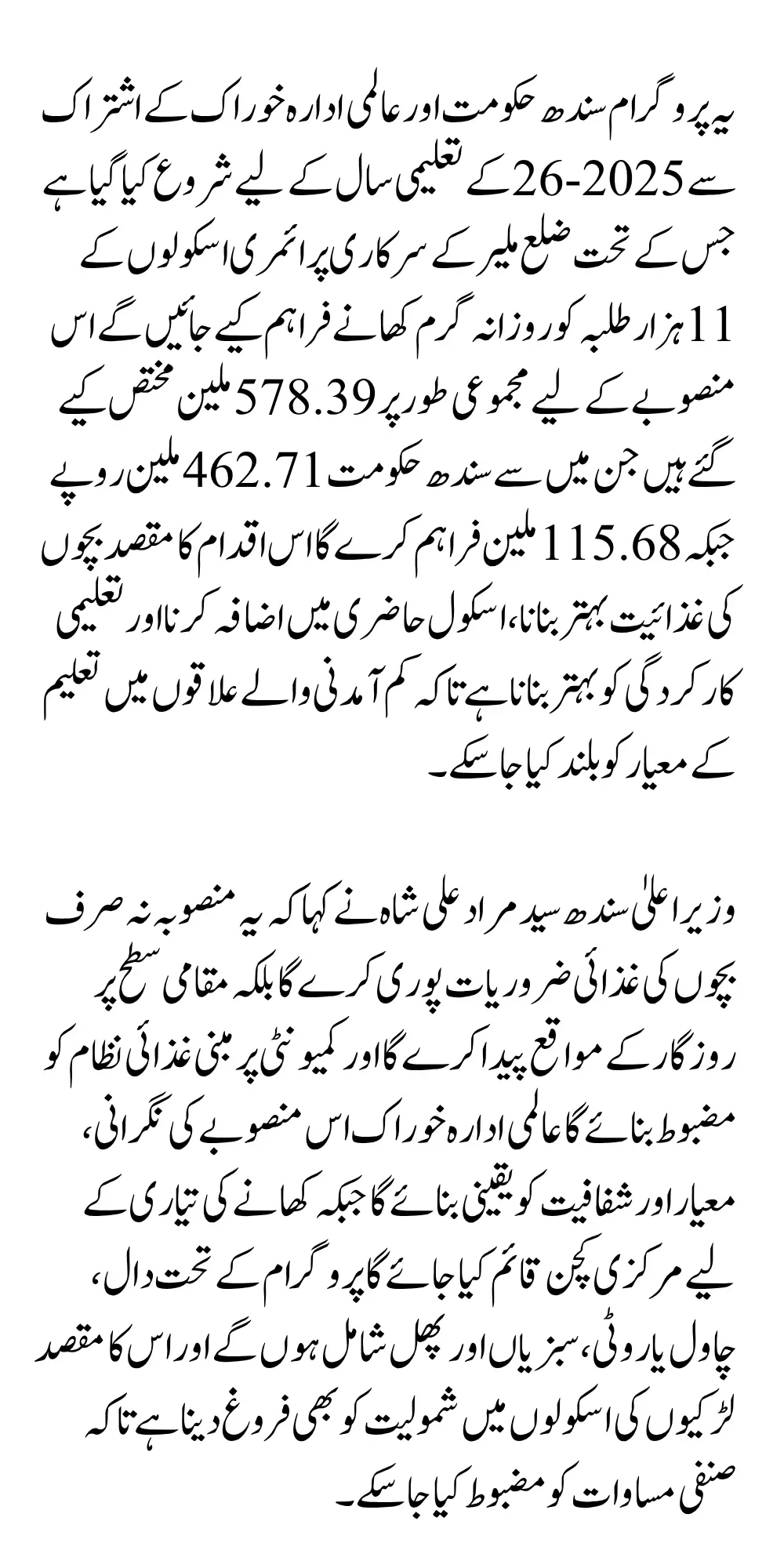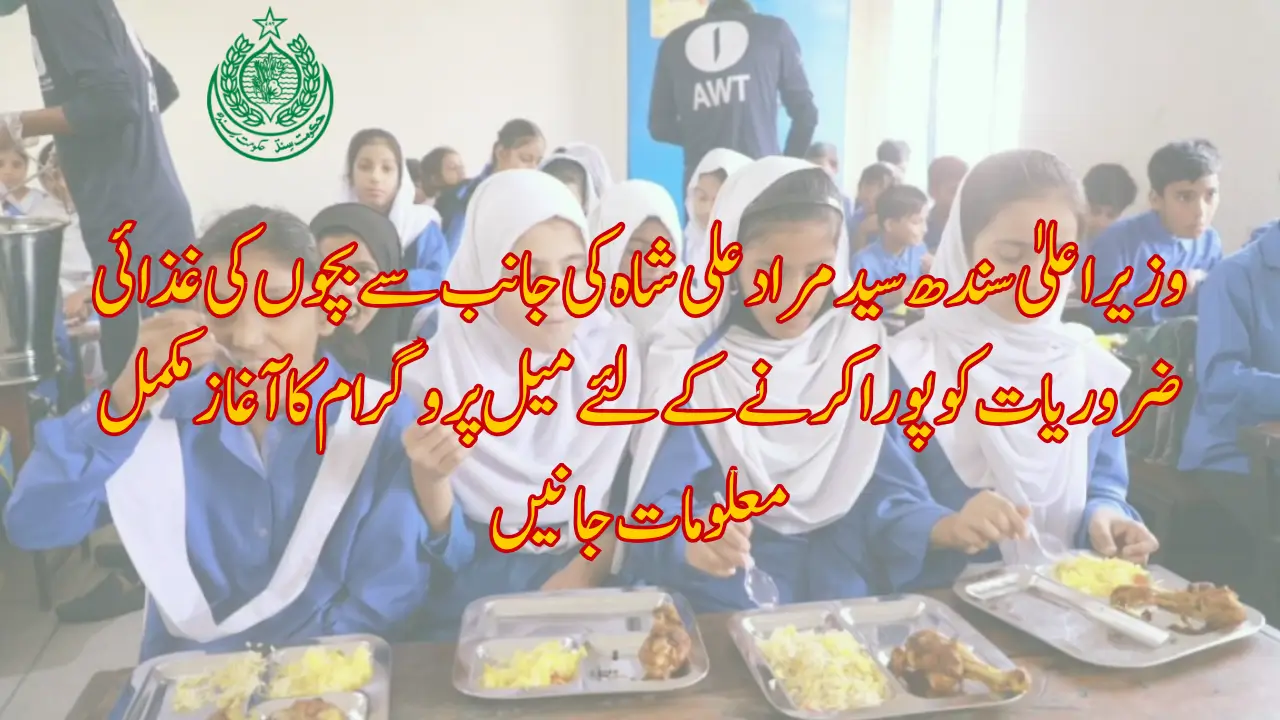School Meal Programme for Public Schools
School Meal Programme for Public Schools: Sindh government in partnership with the World Food Programme has officially launched a one-year School Meals Project for the 2025–26 academic session in Malir District the initiative aims to provide daily hot meals to 11,000 primary school students up to class five, with a total budget allocation of Rs578.39 million this project is designed to improve child nutrition, boost attendance, and enhance learning performance across government schools.

The decision was finalised during a high-level meeting at the Chief Minister House, where Sindh Chief Minister Syed Murad Ali Shah and WFP Country Director Coco Ushiyama discussed the implementation strategy the programme is part of Sindh wider effort to promote educational growth through nutrition-based interventions and reduce classroom hunger in underprivileged areas.
You Can Also Read: Chief Minister IT Internship Program 2025 Apply Online for PKR 50,000
| Key Point | Details |
|---|---|
| Programme Name | School Meal Programme for Public Schools |
| Launched By | Sindh Government in partnership with World Food Programme (WFP) |
| Location | Malir District, Sindh |
| Total Budget | Rs 578.39 million |
| Sindh Government Share | Rs 462.71 million (80%) |
| WFP Contribution | Rs 115.68 million (20%) |
| Target Beneficiaries | 11,000 primary students (up to class five) |
| Meal Contents | Rice or bread, lentils, vegetables, and fruits |
| Goal | Improve nutrition, attendance, and learning performance |
Funding Details and Operational Framework
Under the cost-sharing agreement, the Sindh government will finance Rs462.71 million, which represents nearly 80 percent of the total funding, while the WFP will contribute Rs115.68 million this partnership will ensure that the programme remains financially sustainable and effectively managed the project will begin in selected schools located in peri-urban areas of Malir District that meet essential infrastructure standards, such as clean water, sanitation, and minimum enrolment levels.
To ensure quality and food safety, the Sindh Food Authority and a designated Food Safety Officer will supervise the preparation and distribution process a centralised kitchen will be established to cook, package, and distribute meals, which will include lentils, rice or bread, vegetables, and fruits the WFP will oversee third-party implementation, monitoring, and evaluation, ensuring transparency and efficiency in the delivery of meals to targeted schools.
Monitoring, Impact Goals, And Broader Benefits
Sindh School Meals Programme will adopt a detailed monitoring system to track school attendance, retention, and academic performance the goal is to maintain a minimum of 70 percent daily attendance while ensuring improved focus and classroom participation baseline and endline assessments will be conducted by WFP to measure the impact of the initiative and determine whether it should be expanded to other districts across Sindh.
Chief Minister Murad Ali Shah stated that the project’s success could go beyond nutrition improvement by creating employment opportunities through local food procurement he also emphasised that this initiative would help in building stronger community-based food systems and encourage higher school participation among girls, promoting gender equality in education.
You Can Also Read: Punjab STI Jobs 2025 Portal Opening on 7 November Apply for School
Key Highlights of the School Meal Programme
- Total budget allocation stands at Rs578.39 million for the 2025–26 academic year
- Sindh government contributing Rs462.71 million, WFP adding Rs115.68 million
- Beneficiaries include 11,000 primary school students in Malir District
- Meals will include rice or bread, lentils, vegetables, and fruits
WFP and Sindh Government Commit to Nutrition and Education Goals
WFP Country Director Coco Ushiyama appreciated the Sindh government commitment to improving child health and education through the new meal initiative she shared that WFP will not only support the current project but also continue its work on maternal and child nutrition program such as Nashonuma and Mamta, to fight malnutrition across Sindh.
Murad Ali Shah expressed gratitude for WFP’s long-term partnership and noted that the School Meal Programme would help enhance learning outcomes by addressing child hunger he added that this pilot initiative in Malir would serve as a model for future expansion across Sindh, helping the province progress toward its education and public health goals through sustainable nutrition-focused policies.
Main Objectives of the Sindh School Meal Initiative
- Improve nutritional outcomes and reduce classroom hunger among children
- Increase student attendance, retention, and academic focus
- Support local employment through food production and distribution
- Strengthen community-based food systems and promote gender equity
You Can Also Read: PSX Minor Investor Guidelines 2025 New Rules for Opening Trading Accounts
